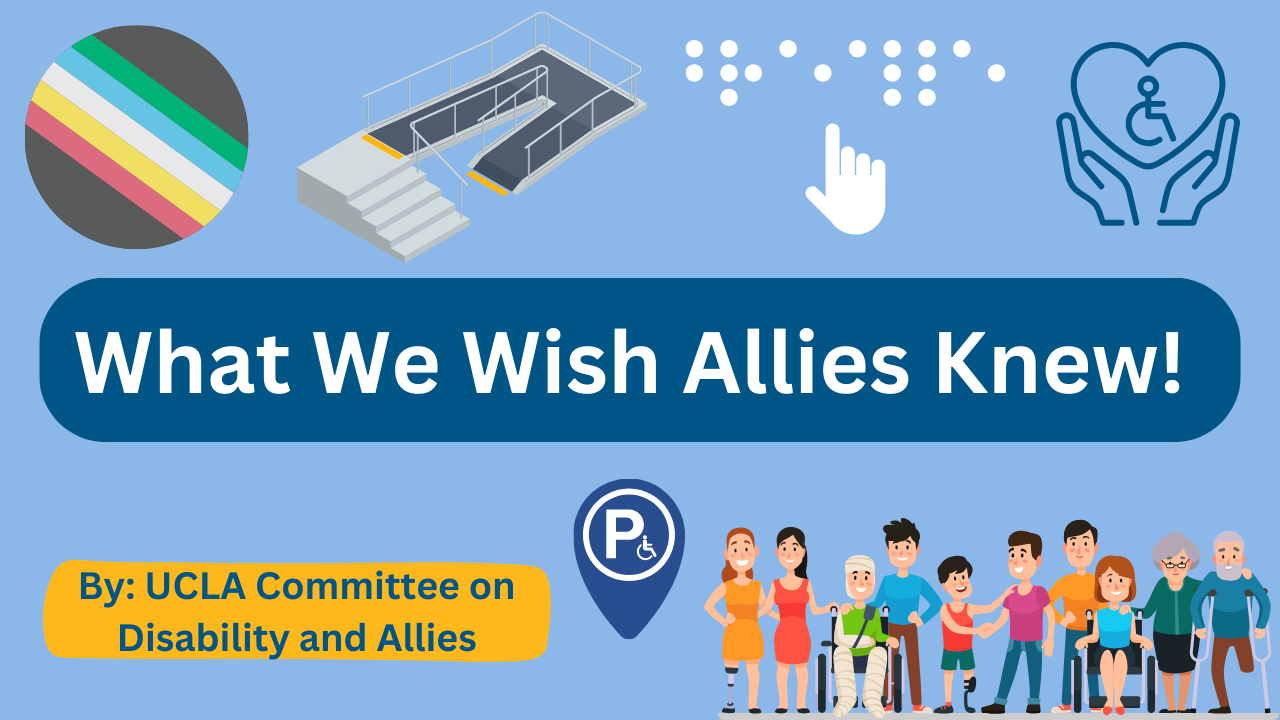
This month we asked members of UCLA Committee on Disability, both disabled and allies, for recommended allyship tips from their personal experiences. Please peruse the following responses.
Allyship is a verb! Make sure you are DOING things to make change!
-Anonymous Disabled Bruin
"A good ally will honor preferred language: i.e. 'person with disability', 'disabled person'. A good ally will also be mindful of derogatory (or ableist) terms and avoid using them. I.e. crazy, insane, lunatic, psycho, etc. This still stands true when saying, for example, “That was crazy.”
- Katherine (Katie) Mayo
"Fragrance-free environments can be important for those who are sensitive to aromas. Perfumes and colognes can cause headaches and a terrible taste in the mouth, especially for those with sensory differences."
- Anonymous Ally
"I wish allies know when to listen!"
- Leroy Moore
"It's okay not to know everything! If someone uses a term, or references an event that happened within the disability community that you don't know about, ask!"
- Emilia
"Please do not use disabled bathrooms/stalls! I know it's so tempting when you have a lot of stuff with you or just want more space but these are wheelchair users' ONLY option!"
-Anonymous Disabled Bruin
"An important thing to consider is incorporating a visual description which figuratively “paints a picture” for the audience and provides a space for the speaker to ensure that people who are blind or low vision can feel connected and understand who’s speaking contextually."
- Katherine (Katie) Mayo
"Fragrance-free environments can be important for those who are sensitive to aromas. Perfumes and colognes can cause headaches and a terrible taste in the mouth, especially for those with sensory differences."
- Anonymous Ally
When a professor forgets to use accommodation tools (e.g., speaking into or passing a microphone for captioning), we appreciate supportive reminders to the professor, when you catch this happening! Oftentimes, asking for something over and over can be exhausting. This is where allies come in!
-Anonymous Disabled Bruin
“As a dyslexic, I would be the first person to tell you that spelling and reading are important skills. But I want the world to know that slow reading, poor spelling and grammar are not the outcome of a slow, careless, unfocused or incompetent mind but the outcome of a real disability. We can be just as smart and capable as the next person but we just need a little more time to finish reading or tools such as word processors and AI to help clean up our writing.”
-Travis Lee (UCLA Staff)
“Living with neurological disorder, my movement is clumsier. In spite of being slower, I have managed to get where I aim to reach on my own. I appreciate the thoughts of those who recognize that and hold the door for me to enter, while saying “take your time”. However, I wanted to let you know that this would add on more stress, emotionally and physically (which may lead me to fall), as my body perceives the need to go faster than usual. Alternatively, you may lend your arm/shoulder and walk with me but without conversation – talking while walking simply does not work for me physically!”
- Fang-I Chu (UCLA Staff)

